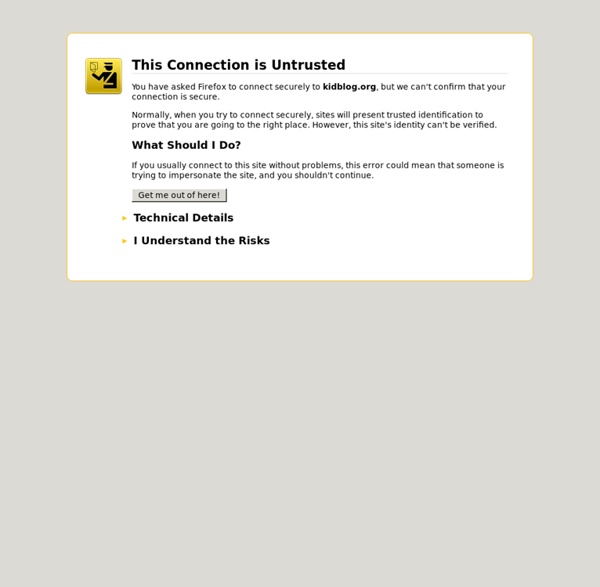



Wikis for Everyone - Wikispaces Education Week Blogging is as much about sharing with one another as it is about getting your own voice out. This week marks my second year anniversary blogging for Education Week. There probably won't be a cake decorated with frosting and candles to celebrate the anniversary, and my Education Week editors may not even know it's been two years (yes, I'm dropping a hint). I'm sure I won't get gifts sent to me or any medals of honor, but what I have gotten over the past two years is much more valuable. The most important part of blogging are the relationships I have created with people I had never met before.
Make a Video. Amazing Animated Video Maker - GoAnimate. - 10 Tools To Engage Students In Academic Discussion Forums- Digital Citizenship Series 0 Comments May 26, 2014 By: Michael Gorman May 26 Spicynodes : Home Ten Ways to Use Discussion Forums to Promote Digital Citizenship and Academics More and more classrooms are opening their doors to student discussion online. This happens in the virtual online classroom, but also in the blended classroom. As you probably know, the blended classroom is one where students and teacher meet in a traditional school but use the Internet to open the classroom walls to the community, region, country, and world. There are many services that provide student discussion forums that can facilitate student online interaction. Some well known ones include, Edmodo, My Big Campus, and Moodle.
Three Tips for Classroom Blogging Projects Just getting back to school with your students? Interested in trying to pull off a classroom blogging project this year? Then these three tips — based on almost ten years of trying to make blogging a part of the work that my students do in the classroom — might be useful to you:
QuadBlogging Connects Student Writers with Global Audiences A blog without an audience is like...a library without books, a car without an engine, Beyonce without a ring. Those were some of the responses David Mitchell (@DeputyMitchell) got when he asked his Twitter followers to fill in the blank. "We all understand the importance of audience," says Mitchell, an educator from the United Kingdom and vocal proponent of using blogs to engage student writers. His latest strategy to connect students with readers around the world is the online phenomenon known as QuadBlogging. Learning How to Comment! Most of Mrs. Yollis' new students are novices to the world of blogging. (A novice is a fancy word for someone who is new or inexperienced at something.) A few students know about blogging because they had a first grade blog with Mrs. Levy. Two students are familiar with blogging because their siblings, Hannah and Miriam, were in Mrs.
Silvia Tolisano- Langwitches Blog Difference between social and academic commenting. You could create a blog for your young students, in order to allow them a safe online space where your young students can socialize and “practice” in an online environment. This type of blog fosters a virtual kind of classroom community that can spill over (positively or negatively)Â into the physical classroom as well. Blogging: Teaching Students How to Quality Comment - Cooper on Curriculum After co-presenting on blogging at EdcampNYC and then blogging about the significance of student work being made public, I have heard lots of conversation and questions regarding how to teach students to comment on each other’s blog posts. In this area, one of the resources that has guided me is the work of Silvia Tolisano. Nonetheless…The last thing we want to do is simply tell students, “Here’s what’s included in a quality comment.” We must model inquiry by having them “uncover” what is involved. Then, students will (1) have a deeper understanding of why these components are significant, and (2) be more likely to apply them.